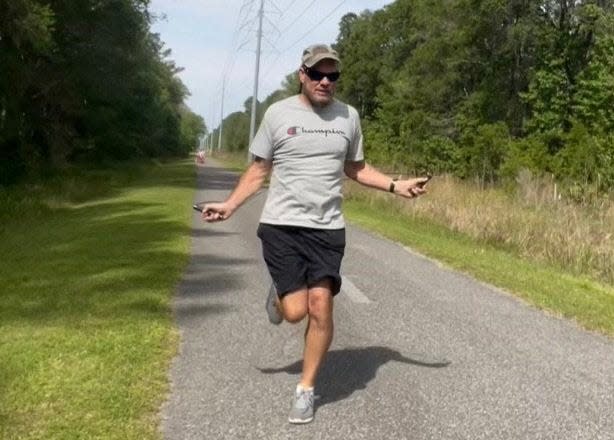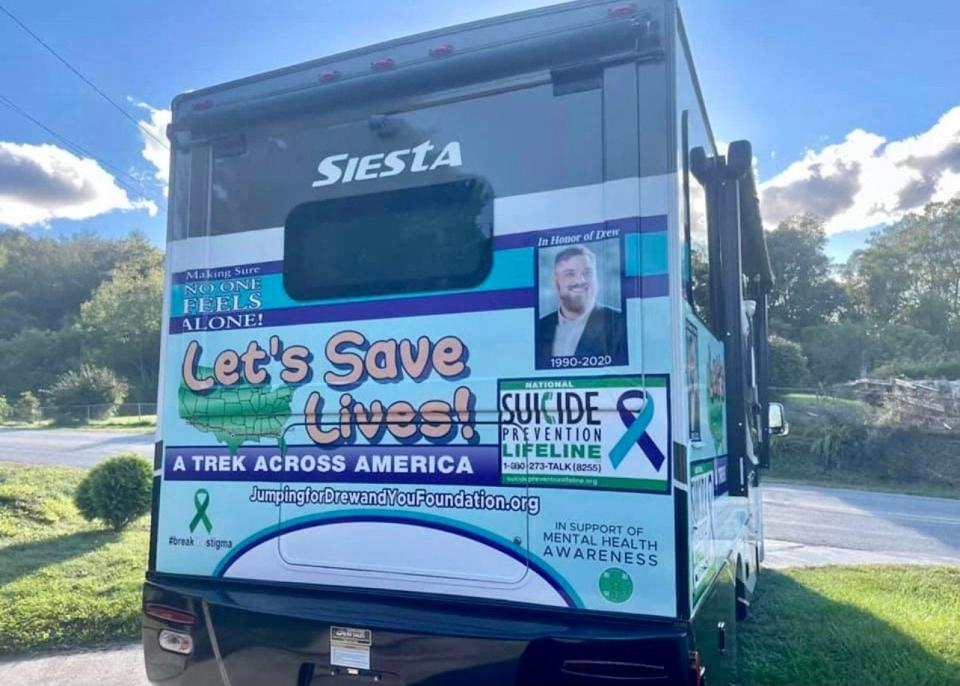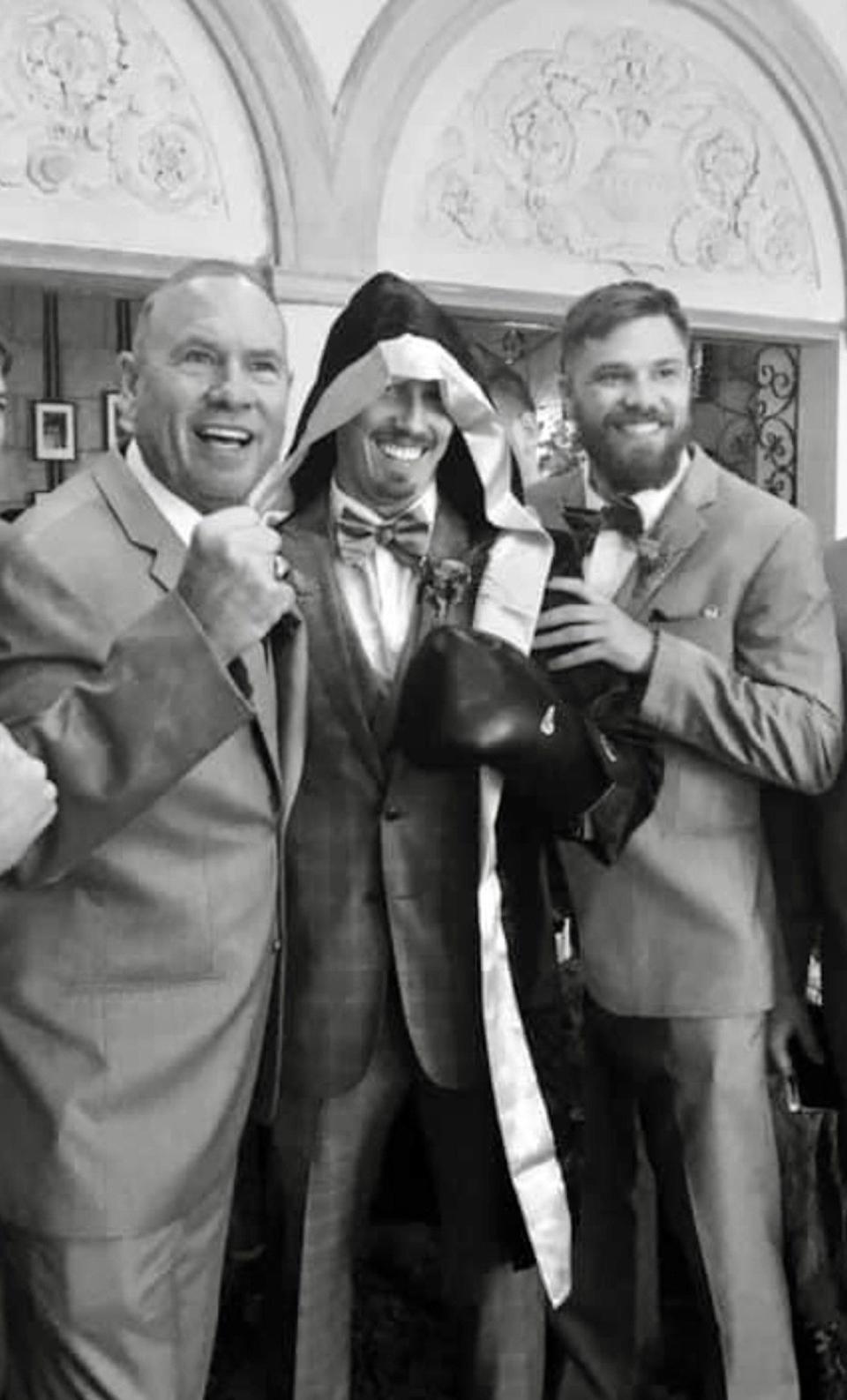He skipped rope and walked across U.S. to honor son, now steps from journey's end in Jacksonville Beach

Daryl Rosenberger began his cross-country journey on Oct. 24, 2021, at the Pacific Ocean in San Diego, heading to Jacksonville, skipping rope for as long as he could every day, then walking the rest.
He says it wasn't something that he, at 65, wanted to do, not with his titanium hip replacement and a bad left knee. But it was something he had to do, to honor his son Drew who committed suicide at age 30 — and to let others contemplating suicide know that they are not alone, that there is help.
He's almost done: At 2:30 p.m. Saturday he'll meet friends and well-wishers at the oceanfront SeaWalk Pavilion in Jacksonville Beach. There will be live music and festivities, and anyone is welcome to come. Then he'll finish with a short loop that will wind around and take him to the Atlantic Ocean's water.
Skip, skip, skip: After son's suicide, Jacksonville native jump ropes and walks across US
Out of father's grief: Suicide-prevention group meets growing need, earns pledge from Delores and Wayne Weaver
He's exhausted, beat-up, but he takes comfort, he said, in so many people telling him they've been helped by his message, which he's conveyed in person and through a considerable online presence.
'A divine meeting'
Just days from the journey's end, Rosenberger got proof that he had made a difference, at least in one person's life.
It happened in Marietta, on Jacksonville's Westside, as he stepped off the road and went behind a church for a quick bathroom break. He said that's where he found a young man, sitting on a bench, a gun in his hand, getting ready to end his life.
The young man asked Rosenberger to leave him alone. But Rosenberger stayed, and they began talking, and talking, telling each other's stories. There is help, Rosenberger told him. And think of the pain of all those you would leave behind.
Rosenberger asked him to give him the ammunition from his gun. He did. Rosenberger said the young man thanked him and told him he was going to try to make a U-turn in his life.
"I call it a divine meeting," he said.
Jacksonville-based Wounded Warrior Project: Finds high rates of suicidal thoughts, pain in veterans
Lucky's last run: His human finishes cross-country trek, but dog forced to stop early
It was one of numerous momentous events on his slow trek across the United States, during which he skipped rope — something he'd long done for exercise — and walked, before crashing for the night in an RV.
It was challenging, and not just physically. He tells of long stretches of desert, with not another person around for miles. He almost got hit by trucks or cars; a half-dozen times, he had to hurl himself off the side of the road to avoid an oncoming vehicle.

Bullets were fired over his RV at night in remote New Mexico; an answering blast from his shotgun sent the shooter fleeing. In the desert, he once went 18 days without being able to take a shower, eating beef jerky and cereal.
It was 2,389 miles, he said, and millions of steps and skips.
Son kept him going
"I‘ve got my own selfish reason for this journey," he said in a January Times-Union interview from the plains of Texas. "It’s self-cleaning. I couldn’t sit around anymore and let this eat at me. I had do something to, I’m not going to say get over it, but just deal with it.”
His son Drew was 30 and wrestling with bipolar disorder when he killed himself in Jacksonville in October 2020, the day after his brother's wedding, at the side of a retention pond near his home.

Daryl Rosenberger, who moved from Jacksonville to Asheville, N.C., about 10 years ago, started an effort called the Jumping for Drew and You Foundation (jumpingfordrewandyoufoundation.org). He's designed the foundation to offer counseling and medication to those who can't afford it and to start a conversation with those who need it.
It's gotten wide exposure on TikTok with 14.2 million views and on its Facebook page too.
He's chronicled his trip online, noting the challenges and the kindnesses he found along the way. He said he never took a day off from the road, for fear he would take another day off afterward.
He never really thought about stopping though, even through the physical pain and the loneliness. Drew kept him going.
“I literally think about him every step," he said. "If I had stopped, I would have dishonored him and the cause. I would have crawled to the finish line if I had to.”
If you or anyone you know is contemplating suicide, the National Suicide Prevention Lifeline is available 24 hours a day at (800) 273-8255. A Jacksonville-area group, Here Tomorrow, is also available at (904) 372-9087 or hello@heretomorrow.org.
This article originally appeared on Florida Times-Union: San Diego to Jacksonville: Father's trek to prevent suicide

